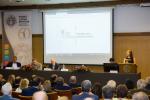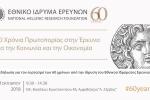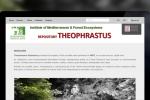
An easy-to-use digitally transformed repository infrastructure, electronically enriched with 2,040 new tokens showcasing the important and internationally recognised work of the National Hellenic Research Foundation (NHRF) is now available.
Following the current international developments in the fields of Open Science and Academic Communication and applying European standards for the dissemination of research data, the National Documentation Centre (EKT) undertook the transformation of the NHRF's "Helios" repository for Greek data, which first appeared in digital form in 2008, into a model electronic infrastructure platform for the collection, organisation and dissemination of digital content.
In the "Helios" repository, where the scientific work of the three NHRF Institutes (Institute of Historical Research, Institute of Chemical Biology, Institute of Theoretical and Physical Chemistry) is collected and made available, including, until 2019, the activities of EKT, there are 9,583 curated and normalised items. The content of "Helios" is organised into collections, according to the structure and actions of the NHRF. Scientific publications in international journals, research papers, announcements and conference proceedings, monographs, events, video lectures, educational materials, research data, multimedia and training materials are available in a modern digital environment and are presented in a direct and user friendly way.
"Helios" targets all members of the scientific and educational community, researchers in the Humanities and Sciences, but can also be used by any citizen interested in seeking material related to these scientific disciplines. Although only the NHRF staff (research and scientific) have the right to deposit material in the repository infrastructure, all potential visitors have the right to register and use it.
The digitally transformed infrastructure of the "Helios" repository, redeveloped by EKT within the framework of the project "Collection, dissemination and exploitaion of the scientific production of NHRF" incorporates new functions for importing, exploring, presenting and visibility of content. These advanced features greatly facilitate the process of submitting new material and make the search and exploration of digital content by its potential users more efficient.
For example, NHRF personnel can upload individual or bulk items from international scientific databases, such as Scopus, to the repository infrastructure and check the item's traffic statistics at regular intervals. At the same time, potential users of the repository, who may be new researchers or educators, can use the repository's dynamic filters and search criteria, explore and reuse digital content focused on their needs and in accordance with its licence. By registering, the user receives certain privileges (additional services), such as automated updates on new content, request for sending copies, etc.
Within the framework of this project, work packages were completed related to:
- technological upgrade of the open source DSpace software platform,
- content documentation and content editing,
- digitisation and processing of new material,
- raising awareness and informing NHRF researchers.
At the technological upgrade level, the Open Software DSpace platform of "Helios" has been upgraded to the latest version, integrating all the modern functions it offers. For ease of use, EKT has developed technical extensions to the DSpace platform that make search, navigation and access to infrastructure content more efficient. In addition, advanced services have been developed that enable the interoperability of infrastructure with third-party systems, the automatic import of records from international open access scientific sources (PubMed, CrossRef, arXiV), the bulk upload of documents from international databases (such as Knowledge and Scopus) and the collection of content from aggregation portals. New functionalities were developed to support the archiving of various types of content by the researchers themselves and to process metadata and evidence. Finally, technical extensions were implemented on the platform for the digital file distribution policy (limited access by a group of users, embargo) as well as for the display of usage and traffic statistics.
At the documentation and content curation level, among other actions, the documentation model of digital resources was upgraded and three (3) files of standard terms were established in EKT's Linked Open Data Infrastructure, Semantics.gr. The entire content of 'Helios' from the previous platform was edited and normalised to the new upgraded infrastructure in accordance with the new documentation model, taking full advantage of the functionality of the new advanced electronic infrastructure. More than 3,740 items were enriched with licences, while 335 existing publications were enriched in compliance with the publisher's open access terms.
At the digitisation and processing of new content level, 2,040 new metadata records with more than 1,300 digital files were added to the new, upgraded repository. Now available in 'Helios' are the seminars of the historian Spyros I. Asdrachas in digital form and the whole videotaped material of the special educational events "Science in Society" organised by the NHRF.
EKT has also implemented awareness-raising, support and information activities for NHRF researchers and the general public, regarding the benefits offered by the new infrastructure of the "Helios" repository to the user communities it serves. There were instructional demonstrations for submitting, archiving and processing content in "Helios" and special seminars for content management and curation. In addition, guides for licences and legal tools, for copyright, for the process of self-archiving and for the management of the semantic vocabularies of the Helios repository were compiled at Semantics.gr.
In the context of the digital transformation of the institutional repository Helios, responsive web design techniques were also implemented and functionalities were developed that allow People with Disabilities (people with sensory disorders, etc.) equal access to the public electronic infrastructure environment. These actions remove the digital exclusion of specific user groups.
List of EKT Repositories
"Helios" was first presented to the public in July 2008 and was one of the first repositories developed by EKT. Since then, the organisation has collaborated with dozens of scientific, cultural and educational bodies and developed 25 digital repositories. The list of Repositories and Digital Collections developed by EKT includes, among others, the repositories of the Acropolis Monuments Preservation Service, the Museum of Cycladic Art, the "Techni" Macedonian Art Society, the Historical Archive of Refugee Hellenism, the Municipality of Refugee Hellenism Forest Ecosystems, the Konstantinos Simitis Foundation, the Observatory of Refugee and Migration Crisis in the Aegean, the Cente for Planning and Economic Research (KEPE), the Public Central Library of Serres with oral histories of local history, etc.
The project
The project "Collection, Dissemination and Exploitation of the Scientific Production of NHRF", OPS 5002535 was implemented by the National Documentation Centre (EKT) under the Operational Programme 'Competitiveness, Entrepreneurship' and Innovation NSRF 2014 -2020, with the co-financing of Greece and the European Union - European Regional Development Fund.
















